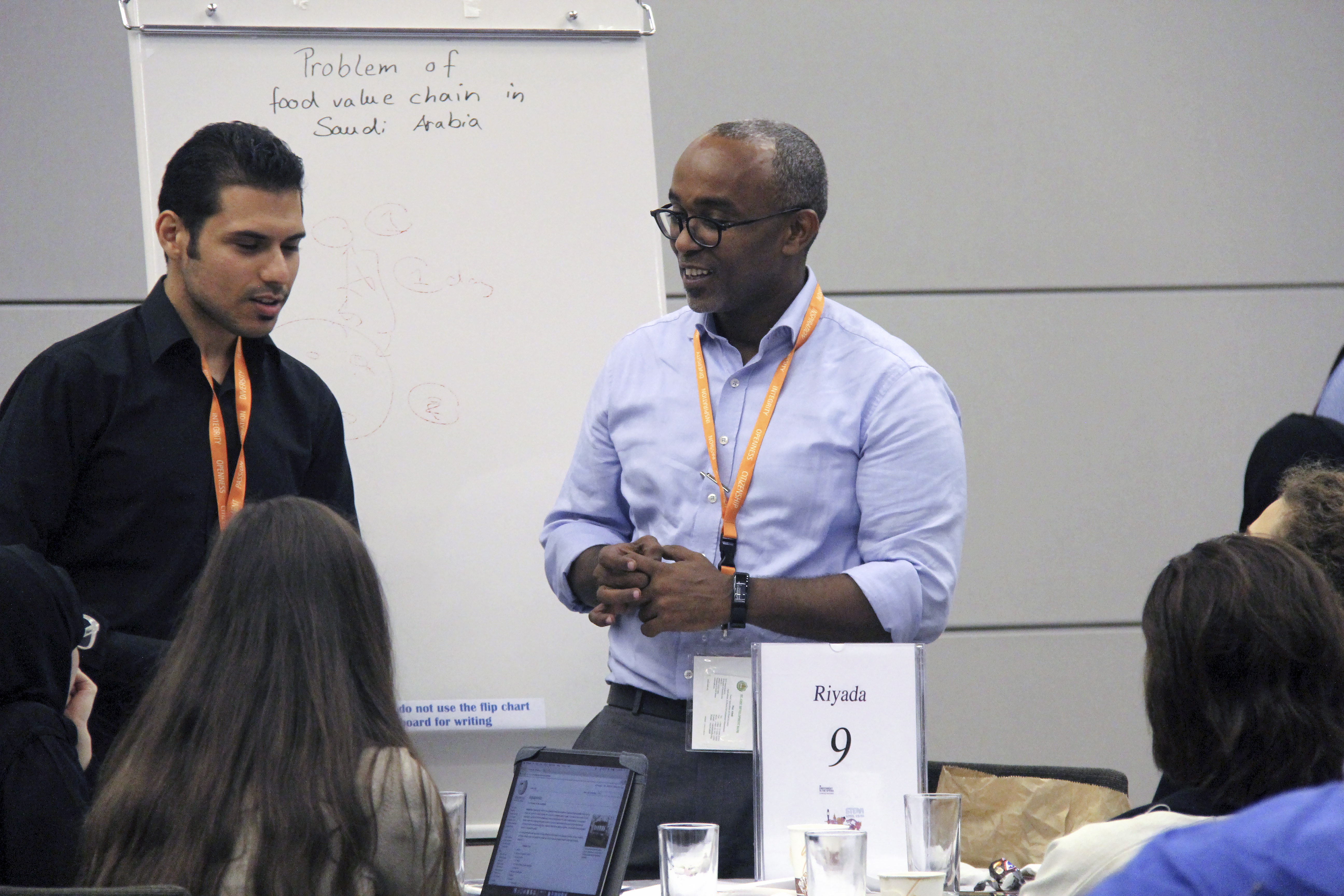Using STEAM to solve global challenges

New Ventures Associate in the KAUST Entrepreneurship Center Abdulrahman Al-Jiffry (left) speaks with IDB Lead Agriculture & Food Security Specialist Nur M. Abdi during the two-day STEAM Innovation Challenge.
How do you solve the global challenges related to food, water and urbanization? The team behind the Science, Technology, Engineering, Arts and Mathematics (STEAM) Innovation Challenge at KAUST thinks they have the answer—put smart people in a room and give them 48 hours to present solutions to these problems.
The Innovation & Economic Development Department (I&ED) at KAUST hosted the STEAM Innovation Challenge on April 29 and 30, in partnership with the Islamic Development Bank (IDB). In 48 hours, teams of students from across the Kingdom moved their ideas from the drawing board to the boardroom, formally presenting solutions to a panel of experts. Prizes were awarded to the top three teams. All 126 students chosen for the program had a background in science, technology, engineering, the arts and mathematics and came from KAUST, King Abdulaziz University (KAU), Effat University, Umm al-Qura University (UQU) and the University of Business and Technology (UBT).
STEAM grew out of the recognition by KAUST and the IDB that some of the challenges facing the Kingdom are issues of local, regional and global significance. Addressing these challenges requires the best work from the brightest minds, students the STEAM challenge aims to identify and develop.
Teams of between four and five members presented solutions that were technically feasible, financially sound, economically viable and environmentally friendly. The winning presentations considered the needs of Saudi Arabia, with scalability beyond the Kingdom as a key factor in the selection of the winners.
"We are delighted with the involvement levels and ideas that came out of the first STEAM Innovation Challenge," said Gordon McConnell, head of the KAUST Entrepreneurship Center whose team designed and delivered the program. "The two-day event was designed to give students a view of real world problems and to help them understand the process of ideation and framing their ideas so they could be communicated to the judges and audience, all the while working with team members they had never met before and under very tight time pressures. The feedback from the students and the visiting faculty members, as well as from the IDB, was tremendous, and we believe that all these students left the event with a new view of the world and how they could make an impact in it."
The first-place winning team received a prize of $10,000 from the IDB:
How do you solve the global challenges related to food, water and urbanization? The team behind the Science, Technology, Engineering, Arts and Mathematics (STEAM) Innovation Challenge at KAUST thinks they have the answer—put smart people in a room and give them 48 hours to present solutions to these problems.
The Innovation & Economic Development Department (I&ED) at KAUST hosted the STEAM Innovation Challenge on April 29 and 30, in partnership with the Islamic Development Bank (IDB). In 48 hours, teams of students from across the Kingdom moved their ideas from the drawing board to the boardroom, formally presenting solutions to a panel of experts. Prizes were awarded to the top three teams. All 126 students chosen for the program had a background in science, technology, engineering, the arts and mathematics and came from KAUST, King Abdulaziz University (KAU), Effat University, Umm al-Qura University (UQU) and the University of Business and Technology (UBT).
Creating the innovators of tomorrow
Teams of between four and five members presented solutions that were technically feasible, financially sound, economically viable and environmentally friendly. The winning presentations considered the needs of Saudi Arabia, with scalability beyond the Kingdom as a key factor in the selection of the winners.
"We are delighted with the involvement levels and ideas that came out of the first STEAM Innovation Challenge," said Gordon McConnell, head of the KAUST Entrepreneurship Center whose team designed and delivered the program. "The two-day event was designed to give students a view of real world problems and to help them understand the process of ideation and framing their ideas so they could be communicated to the judges and audience, all the while working with team members they had never met before and under very tight time pressures. The feedback from the students and the visiting faculty members, as well as from the IDB, was tremendous, and we believe that all these students left the event with a new view of the world and how they could make an impact in it."
Winners from KAUST and Saudi universities
The first-place winning team received a prize of $10,000 from the IDB:
- Daniel Corzo (KAUST)
- Linah Hussain (KAU)
- Hibatullah Bensaid (Effat University)
- Anmar Baitalmal (UQU)
- Malak Mousali (KAU)
- Truki Khursheed (UBT)
- Mona Alsomali (KAUST)
- Mahammed Nadershah (UBT)
- Tareq Ojemy (UQU)
- Shahrazad Emetennani (KAUST)
- Leena Almashat (KAU)
- Eynas Balkhair (Effat University)

